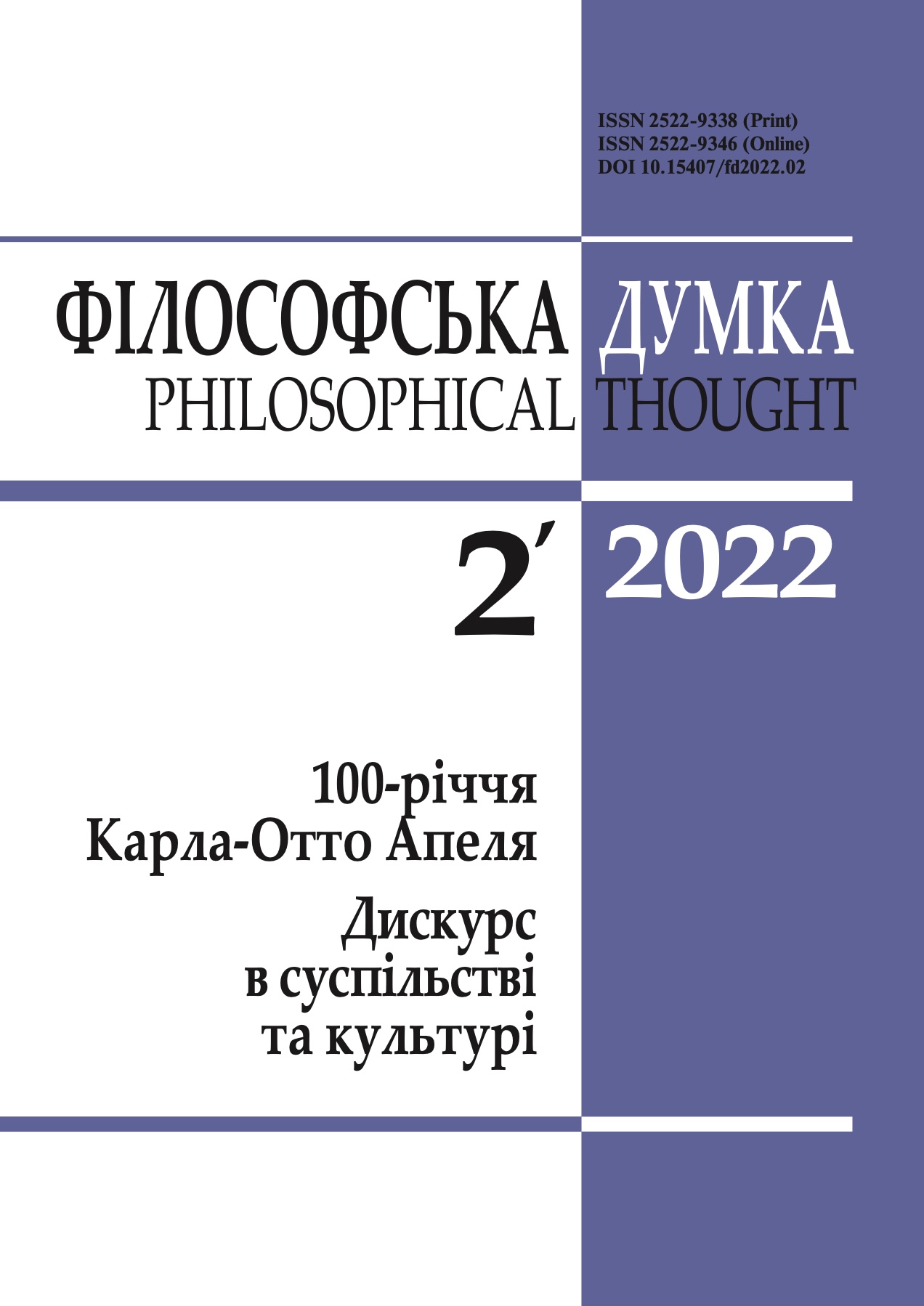SOCIO-CULTURAL FOUNDATIONS OF DISCOURSE AND MODERN TRANSFORMATION
DISCOURSE IN SOCIETY AND IN CULTURE
DOI:
https://doi.org/10.15407/fd2022.02.067Keywords:
discourse, meaning, speech, globalization, modernity, production, infopowerAbstract
The article considers the place and role of discourse in human life. The basis for this is the im- portance of language and speech as one of the leading features of humanity. Thanks to language, a person’s own reality is formed, which has a semantic character. Four dimensions of the effect of speech in the constitution of the human world are identified. These are: the function of se- mantic productivity and reliability of speech; function of organization and accumulation of ex- perience; the function of normativity of human life; personalization function. The acquisition of the discourse format by speech is associated with the assertion of significance and substantiation of the validity of judgments. These qualities of discursive practices are inseparable from their normative effect. If speech as such is dominated by the effect of communication and statements, the discourse is primarily a semantic ordering of reality. It always creates, transforms or cancels a certain semantic order. The thesis on the growing role of discursive practices in the contempo- rary world is substantiated. This is due to the epoch-making changes in human life, namely the end of the era of production. The whole history of human civilization can be represented as the development of production (from the invention of the production mode of economy in the form of the Neolithic revolution). The end of the era of production means at the same time the actu- alization of the great historical task of man’s appeal to himself, to his own nature and organic ability to live. Taking care of yourself, not the conditions of existence (external goods) will be a priority for human development in the near historical perspective. However, this reorientation of human existence is confronted with the contradictory impact of virtualization of reality for man, which entails changes in the classical vocation of discourse. In this regard, the effect of discourses in the highly powerful information environment of today is analyzed, which is becoming the leading force of global reality in the form of information power.
References
Apel, K.-O. (1996). Justification of ethics of responsibility. [In Ukrainian]. Justification of ethics of responsibility. Kyiv: Lybid.
Baudrillard, J. (2000). The transparency of evil. [In Russian]. Moscow.
Castells, M. (2000). Information age: economy, society and culture. [In Russian]. Moscow: State University "Vyshcha Shkola Ekonomiki".
David, R., Zhoffre-Spinozi, K. (1998). The main legal systems of our time. [In Russian]. Moscow: Mezhdunarodnye otnoshenia.
Deleuze, G. (1995). The logic of sense. [In Russian]. Moscow: Akademia.
Dilthey, W. (1990). Einleitung in die Geisteswissenschaften. Versuch einer Grundlegung für das Studium der Gesellschaft und der Geschichte. Stuttgart: Vandenhoeck & Ruprecht Verlage.
https://doi.org/10.13109/9783666303012
Epstein, M. (2004). The space sign: About the future of humanitarian sciences. [In Russian]. Moscow: New Literary Review.
Fodor, J.A. (1975). The Language of Thought. Cambridge, MA: Harvard University Press. Foucault, M. (2000). History of sexuality. Volume 3: Nurturing yourself. [In Ukrainian]. Kharkiv: OKO.
Heidegger, М. (1977). Die Zeit des Weltbildes // Gesamtausgabe. Bd. 5. Holzwege. Frankfurt a.M.: Vittorio Klostermann.
Lévi-Strauss, C. (1997). Structural anthropology. [In Ukrainian]. Kyiv: Osnovy.
Plato (2000). Apologia Sokrata. [In Ukrainian]. In: Plato, Dialogues. Kharkiv: Folio.
Vasiliev, L. (1980). Stanovlenie politicheskoi administratsii. [In Russian]. Narody Azii i Afriki, 1.
Virno, P. (2015). Grammatika mnozhestva. K analizu form sovremennoj zhizni. [In Russian]. Moscow: Ad Marginem Press.
Whоrf, B. (1956). Language, Thought and Reality. New-York.
Downloads
-
PDF (Українська)
Downloads: 149
Published
How to Cite
Issue
Section
License
Authors who publish with this journal agree to the following terms:
- Authors retain copyright and grant the journal right of first publication.
- Authors are able to enter into separate, additional contractual arrangements for the non-exclusive distribution of the journal's published version of the work (e.g., post it to an institutional repository or publish it in a book), with an acknowledgement of its initial publication in this journal.
- Authors are permitted and encouraged to post their work online (e.g., in institutional repositories or on their website) prior to and during the submission process, as it can lead to productive exchanges, as well as earlier and greater citation of published work (See The Effect of Open Access).


